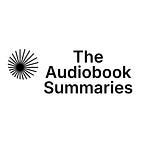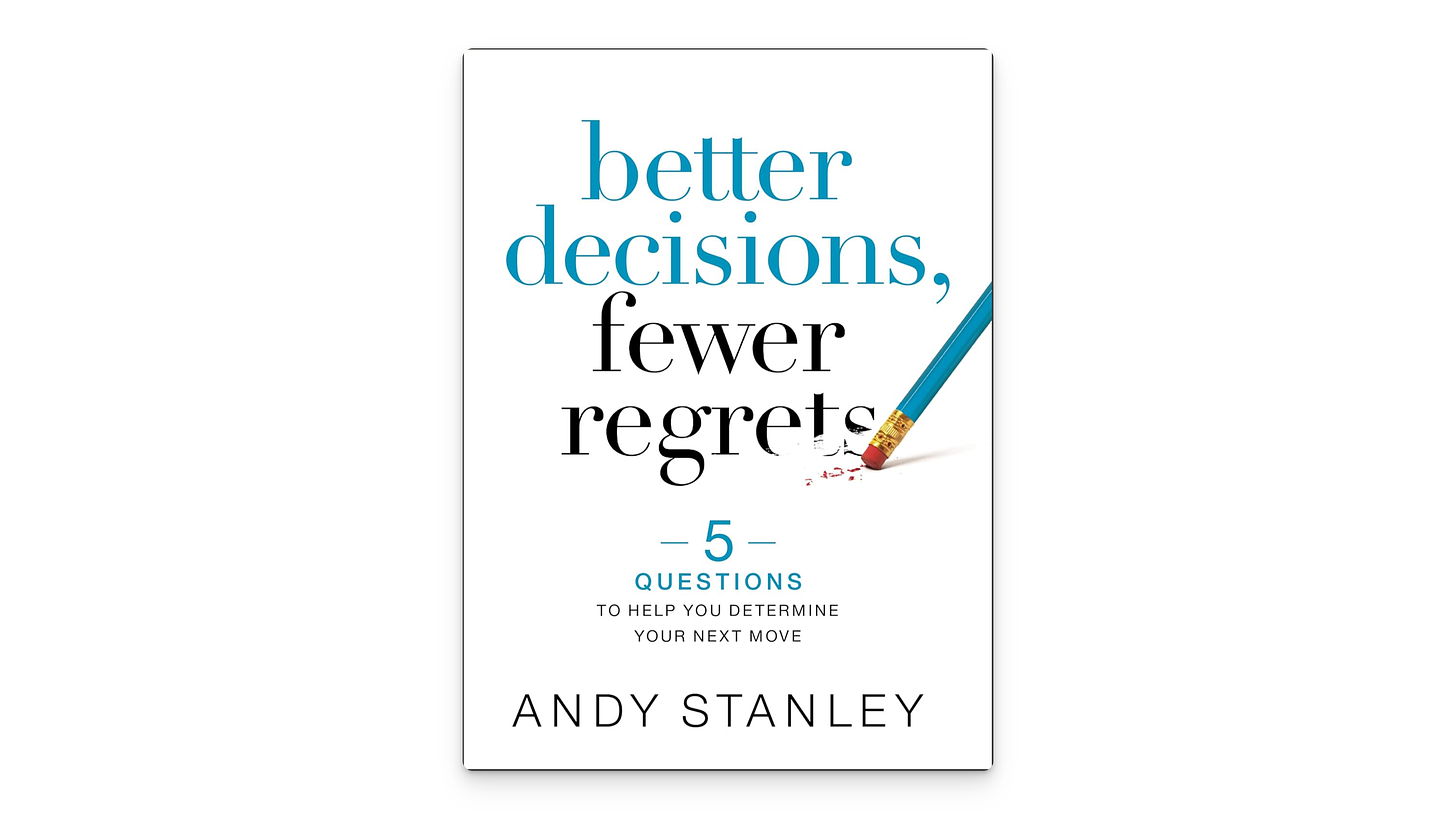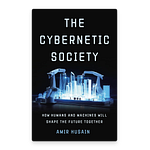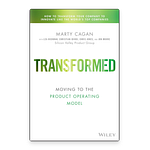by Andy Stanley
The decisions that define us
Picture yourself at a crossroads. One road points to a dream job in another city, but taking it would mean leaving your parents when they’re beginning to need you more. Another road offers the safety of staying put, but at the cost of professional growth. Which way do you turn?
Every day we face choices like these—some small, others life-altering. The career to pursue, the relationships to invest in, the habits to nurture or abandon. Over time, these decisions accumulate, shaping the story of our lives. Yet most of us make them with no reliable framework. We lean on emotion, habit, or the loudest voice in the room, only to look back later and wonder: What was I thinking?
Andy Stanley’s Better Decisions, Fewer Regrets offers a way forward: five simple but searching questions that cut through self-deception, clarify what truly matters, and help us build lives we’ll be proud to look back on. They don’t eliminate uncertainty, but they do give us a compass—one that points toward fewer regrets and more meaningful choices.
Life is the sum of your choices
It’s comforting to think our lives are shaped mostly by luck or circumstances outside our control. But take a closer look: where you work, who you love, how secure you feel—these are largely the result of thousands of choices you’ve made.
That realization can sting. It means some of your pain is self-inflicted. But it’s also empowering: if choices got you here, different choices can take you somewhere better.
The challenge is that we rarely see our bad decisions coming. Big regrets are usually not single, impulsive mistakes. They’re the result of small, reasonable-sounding choices that compound over time. The marriage that collapsed wasn’t doomed on the wedding day—it unraveled through years of ignored warning signs. The crushing debt didn’t appear overnight—it accumulated through hundreds of swipes of the card that all seemed justified in the moment.
Stanley calls this planning our regrets. We don’t stumble into disaster; we construct it, step by step, rationalization by rationalization. That’s why learning to interrupt the cycle matters so much. The first step is stripping away the lies we tell ourselves.
Question 1: Am I being honest with myself—really?
Self-deception is like fog on a windshield: it blurs reality just enough to make a bad turn feel safe. We lie to ourselves more than to anyone else.
That new gadget? You call it an “investment.” That relationship full of red flags? You label it “giving them another chance.” That late-night scroll through social media? You say it’s just “unwinding.”
Here’s the pattern: your heart wants something, then your mind goes to work as its lawyer, building a case with selective facts and half-truths.
The antidote is a simple, disarming question: Am I being honest with myself—really? The “really” matters, because it forces you past the polished version of the truth you’d rather believe. Try saying it out loud, even with your own name: Am I being honest with myself, Sarah? Really?
The answer may sting, but clarity beats comfort. Without it, you’ll keep chasing what feels good in the moment, only to regret it later.
Question 2: What story do I want to tell?
Think about the story you’ll tell at your next class reunion, or years from now to your kids. Every decision you make today becomes a sentence in that story.
When you choose a career move, end a relationship, or respond to a setback, you’re adding chapters to your personal narrative. The question is: will you be proud to tell them, or will you edit the details, hoping no one asks too many questions?
Framing choices in terms of story shifts your perspective. Instead of obsessing over the short-term payoff, you consider how the decision will echo over time.
Ask yourself: If I do this, how will it read in the story of my life? Will it be a story of courage, integrity, and growth—or of shortcuts, avoidance, and regret?
Stories last longer than pleasures. Choose the path that leaves you with a story worth retelling.
Question 3: Is there a tension that deserves my attention?
Sometimes logic says one thing, but your gut says another. You make the pros-and-cons list, and everything lines up on paper—yet a faint unease won’t let you rest.
That feeling is worth listening to. Your subconscious often picks up on signals your conscious mind hasn’t processed yet: an inconsistent detail, a hidden cost, a value clash.
Consider this example. A young entrepreneur once told Stanley about nearly signing a deal with an investor. On paper, the terms were solid. But he couldn’t shake the nagging discomfort he felt every time he met the man. Instead of dismissing it, he pressed pause. Months later, he learned the investor was facing legal trouble that would have sunk the business by association. His gut had registered the warning signs long before his head could articulate them.
That’s the power of tension. It doesn’t always mean don’t do it. Sometimes it simply means don’t rush it. Pause. Ask: What is this discomfort trying to tell me?
Ignoring it may lead you straight into regret. Honoring it gives you the chance to adjust course before it’s too late.
Question 4: What is the wise thing to do?
Most people make decisions by asking what’s allowed. Is it legal? Is it technically okay? Can I get away with it?
But wisdom demands a higher bar. A choice can be legal, moral, and socially acceptable—and still be reckless for you.
Wisdom reframes the question: Given my past experiences, my present circumstances, and my future hopes, what is the wise choice?
Maybe that’s saying no to “just one more drink” when you know your limits. Maybe it’s holding off on the house purchase until your finances stabilize. Maybe it’s declining the prestigious promotion because your family needs you more than your résumé does.
Wisdom also respects timing. In seasons of grief, transition, or high stress, even good opportunities can become traps. The wise often wait until the fog clears before locking in life-altering choices.
Think of wisdom not as a restriction but as a compass. It doesn’t just keep you from harm—it points you toward flourishing.
Question 5: What does love require of me?
This last question cuts deepest. The Golden Rule—treat others the way you want to be treated—is good. But love raises the standard. It asks: What does loving this person well look like, right now?
Love moves us beyond fairness into healing. It turns patience into slowing down to someone else’s pace. It transforms kindness into offering strength where another is weak. It reframes forgiveness as refusing to keep score.
And crucially, as Stanley emphasizes, love eliminates loopholes. You can’t justify gossip by saying, “Well, I didn’t technically lie.” You can’t excuse cruelty with, “I was just being honest.” When love is the standard, clever technicalities dissolve.
Picture the moment of conflict with your teenager who just slammed the door. Your pride wants the last word. Love asks you to pause, knock gently, and listen. Or imagine a colleague you’ve been avoiding after a disagreement. Pride urges withdrawal. Love nudges you to initiate repair.
Love won’t guarantee reciprocation. People may still reject or misuse your effort. But if you choose what love requires, you’ll walk away with fewer regrets—and often with relationships restored in ways fairness alone could never accomplish.
Standing at the crossroads
These five questions—Am I being honest with myself, really? What story do I want to tell? Is there a tension that deserves my attention? What is the wise thing to do? What does love require of me?—form more than a checklist. Together, they’re a compass.
They don’t promise easy answers. But they do force you to slow down, clear the fog, and look further down the road before taking your next step.
Life is, after all, the sum of your decisions. Each one is a turn at the crossroads. Ask better questions, and you’ll take turns that lead to stories worth telling, relationships worth cherishing, and a future with fewer regrets.
About the author
Andy Stanley is a pastor, communicator, and founder of North Point Ministries, a network of churches serving hundreds of thousands worldwide. He hosts the widely distributed program Your Move with Andy Stanley and has written several bestselling books, including Irresistible and Deep & Wide.









